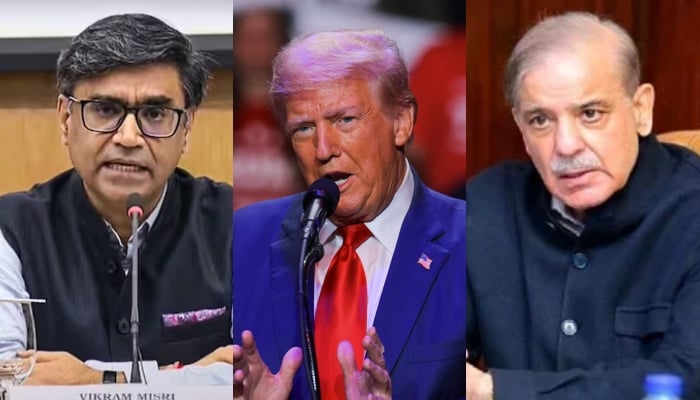
- PM Shehbaz Sharif thanks President Trump for playing role in ceasefire.
- India says ceasefire was “bilateral” decision by Islamabad and New Delhi.
- Foreign Secretary Misri falls short of commenting loss of Indian aircraft.
India has dismissed claims that the United States played any role in brokering the recent ceasefire with Pakistan, saying the halt in fighting was only “bilateral”, while Islamabad has repeatedly thanked American President Donald Trump for helping in ending the cross-border hostilities.
The ceasefire was reached on May 11 after hours of exchange of fire along the Line of Control (LoC), which separates Azad Jammu and Kashmir from the Indian Illegally Occupied Jammu and Kashmir.
Both sides had been involved in heightened military confrontation following India’s strikes in Pakistan, branded as response to last month’s Pahalgam incident. The cross-border tensions raised concerns of a nuclear war.
Speaking during a visit to Karachi on Monday, Pakistan’s Prime Minister Shehbaz Sharif said the US played an important part in securing the agreement.
“Trump is a man of peace. I believe his team engaged with this situation wholeheartedly and played a vital role in securing the ceasefire,” Sharif said, referring to President Trump.
President Trump had earlier told reporters in Washington: “We stopped a nuclear conflict. I think it could have been a bad nuclear war, millions of people could have been killed. So I’m very proud of that.”
India, however, has rejected these claims. Foreign Secretary Vikram Misri told a parliamentary panel in New Delhi on Monday that the ceasefire was a bilateral decision between India and Pakistan, with no involvement from any third party. He said there was no “nuclear signalling” from Pakistan and that India had acted in line with its own interests.
Members of the committee questioned why India had not responded to Trump’s repeated claims. One MP asked why India had let the US “seize the narrative,” particularly since Trump had spoken about Kashmir several times.
The foreign secretary did not comment on the number of Indian aircraft lost during the clashes, saying it was a matter of national security.
India launched unprovoked missile attacks on multiple Pakistani cities during the night of May 6 and 7, which New Delhi claimed were aimed at “terrorist targets” in response to last month’s Pahalgam attack in the IIOJK, that left 26 tourists dead.
In response, Pakistan armed forces launched a large-scale retaliatory military action, named “Operation Bunyan-um-Marsoos” and targeted several Indian military strikes across multiple regions in retaliation to Indian strikes that killed a number of civilians besides army personnel.
The strikes, described by officials as “precise and proportionate”, were carried out in response to India’s continued aggression across the Line of Control (LoC) and within Pakistan’s sovereignty.
Pakistan’s response mobilised global powers, which eventually led to a ceasefire.